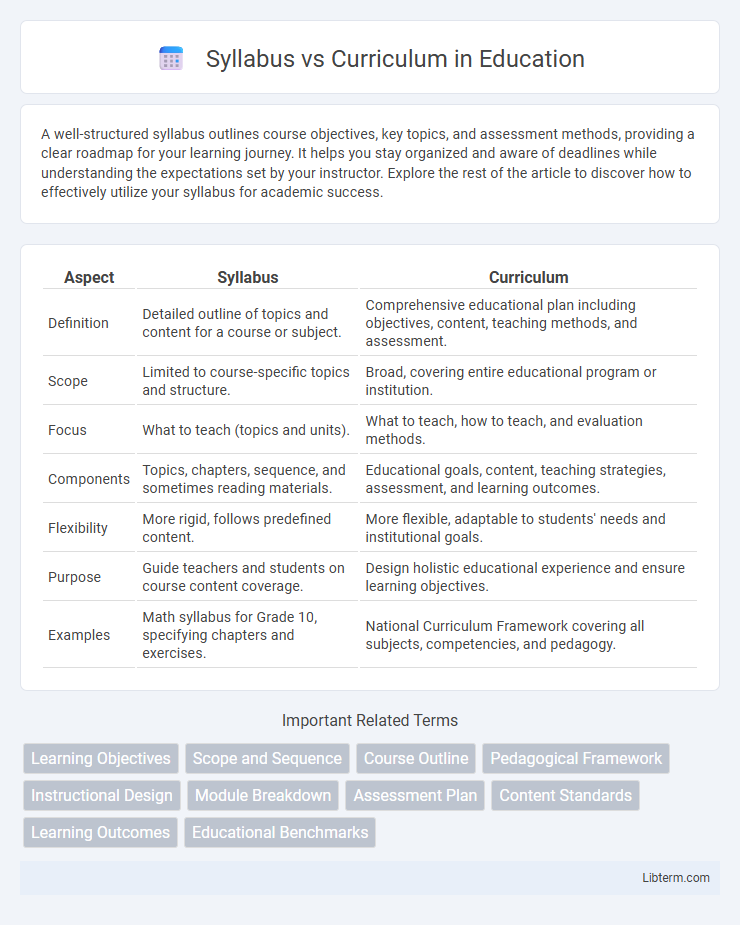A well-structured syllabus outlines course objectives, key topics, and assessment methods, providing a clear roadmap for your learning journey. It helps you stay organized and aware of deadlines while understanding the expectations set by your instructor. Explore the rest of the article to discover how to effectively utilize your syllabus for academic success.
Table of Comparison
| Aspect | Syllabus | Curriculum |
|---|---|---|
| Definition | Detailed outline of topics and content for a course or subject. | Comprehensive educational plan including objectives, content, teaching methods, and assessment. |
| Scope | Limited to course-specific topics and structure. | Broad, covering entire educational program or institution. |
| Focus | What to teach (topics and units). | What to teach, how to teach, and evaluation methods. |
| Components | Topics, chapters, sequence, and sometimes reading materials. | Educational goals, content, teaching strategies, assessment, and learning outcomes. |
| Flexibility | More rigid, follows predefined content. | More flexible, adaptable to students' needs and institutional goals. |
| Purpose | Guide teachers and students on course content coverage. | Design holistic educational experience and ensure learning objectives. |
| Examples | Math syllabus for Grade 10, specifying chapters and exercises. | National Curriculum Framework covering all subjects, competencies, and pedagogy. |
Understanding Syllabus and Curriculum
The syllabus is a detailed outline of specific topics, assignments, and assessments for a particular course, serving as a guide for both instructors and students. Curriculum encompasses a broader educational framework, including the overall objectives, content, teaching methods, and evaluation criteria across multiple courses or an entire program. Understanding the distinction between syllabus and curriculum is essential for effective academic planning and ensuring coherent learning outcomes.
Key Differences Between Syllabus and Curriculum
The key differences between syllabus and curriculum lie in their scope and detail; a syllabus is a specific outline of topics and objectives covered in a single course, while a curriculum encompasses the complete set of courses and learning experiences offered by an educational program or institution. The syllabus provides detailed information including lesson plans, assignments, and assessment methods for a particular subject, whereas the curriculum defines the overall educational goals, standards, and progression across multiple subjects. Understanding these distinctions helps educators design effective instructional plans aligned with institutional learning outcomes.
Definitions: Syllabus vs Curriculum
A syllabus is a detailed outline that specifies the topics, objectives, assignments, and assessment methods for a particular course or subject. Curriculum encompasses the broader educational framework, including the overall content, learning experiences, teaching methods, and evaluation processes across multiple courses or an entire academic program. While the syllabus focuses on individual course specifics, the curriculum defines the comprehensive educational goals and structure at the institutional or program level.
Scope and Coverage in Syllabus and Curriculum
The syllabus outlines specific topics, objectives, and materials to be covered within a course, providing a narrow and detailed scope focused on individual classes. The curriculum encompasses a broader framework, integrating multiple syllabi to establish the overall educational goals, competencies, and progression across an entire program or academic level. While the syllabus directs day-to-day teaching activities, the curriculum ensures coherent scope and coverage aligned with institutional standards and long-term learning outcomes.
Purpose and Objectives of Each
A syllabus outlines specific course content, learning outcomes, and assessment methods aimed at guiding students through a particular subject or module. Curriculum encompasses a broader educational framework designed to achieve institutional or program-wide goals, integrating multiple syllabi to ensure comprehensive skill and knowledge development. The syllabus focuses on immediate instructional objectives, whereas the curriculum targets long-term educational aims and overall academic coherence.
Who Prepares the Syllabus and Curriculum?
The syllabus is typically prepared by individual course instructors or academic departments to outline specific topics, learning objectives, and assessment methods for a particular course. In contrast, the curriculum is designed by educational boards, institutions, or government authorities to establish a comprehensive framework encompassing all courses, sequences, and educational goals within a program or grade level. While the syllabus provides detailed content for classroom instruction, the curriculum sets the overarching academic standards and learning pathways.
Components Included in Syllabus and Curriculum
A syllabus typically includes detailed components such as course objectives, topics covered, reading materials, assignments, grading criteria, and class policies. In contrast, a curriculum encompasses broader elements like the overall educational goals, course sequences, learning outcomes, credit requirements, and assessment standards across multiple courses or an entire program. While the syllabus provides a specific roadmap for individual courses, the curriculum ensures a cohesive educational framework aligning multiple syllabi toward comprehensive skill and knowledge development.
Role in the Educational Process
The syllabus outlines specific topics, learning objectives, and assessment methods for a particular course, guiding both teachers and students throughout the instructional period. The curriculum encompasses the broader educational framework, defining overall goals, standards, and content across grade levels or programs to ensure coherent skill development. Together, the syllabus implements the curriculum's vision by providing a detailed roadmap for day-to-day teaching and evaluation.
Flexibility and Updates: Syllabus vs Curriculum
A syllabus offers greater flexibility by allowing instructors to tailor content and pacing to specific class needs, enabling frequent updates to reflect recent developments or student progress. In contrast, a curriculum provides a comprehensive framework established by educational authorities, typically updated less often to maintain standardized learning objectives across institutions. This distinction makes syllabi more adaptable for dynamic teaching environments, while curricula ensure consistency and alignment with long-term educational goals.
Importance in Academic Planning
Syllabus and curriculum play distinct but complementary roles in academic planning; the curriculum outlines the overall educational objectives, content scope, and learning outcomes across an entire program, while the syllabus provides detailed daily lesson plans, assessments, and specific instructional materials for individual courses. Emphasizing the curriculum ensures alignment with institutional goals and accreditation standards, while a well-structured syllabus facilitates effective classroom management and student engagement. Strategic integration of both elements enhances curriculum coherence, promotes consistent academic quality, and supports targeted skill development.
Syllabus Infographic

 libterm.com
libterm.com